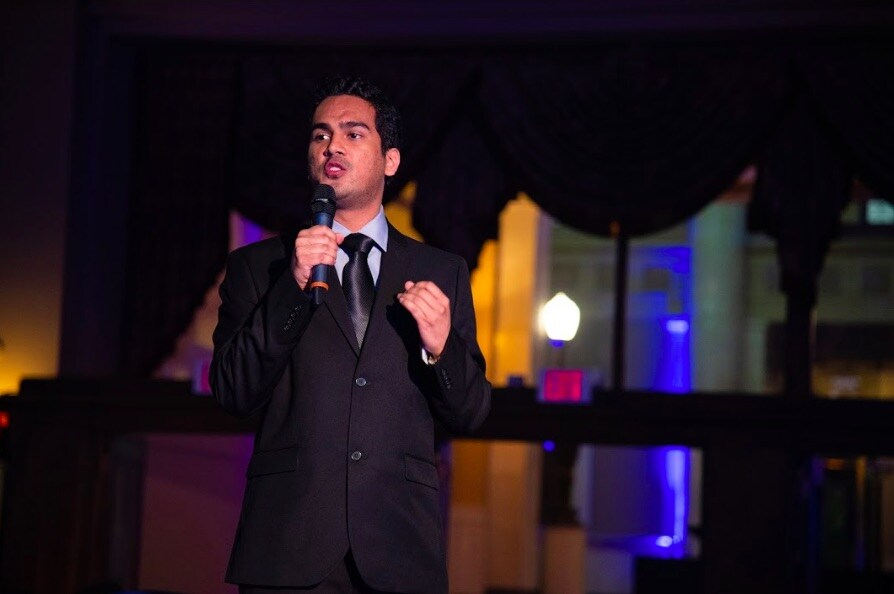Why three recent STEM graduates changed their minds about their degrees

Recent McMaster computer science graduate Ryan Ticlo co-founded Senso Minds, a company providing therapy tools to help children with sensory disorders, with no business background nor knowledge in that industry. Ryan pitched his company at Lion’s Lair where they became finalists.
By Fiona Lam
A company providing therapy tools for children with sensory issues would seem worlds away from three recent McMaster and Ryerson engineering and computer science graduates. But when they discovered a need in the clinical rehabilitation market, they decided to take a leap and begin building their budding business, Senso Minds, in 2018.
In its first year, Senso Minds grew its first product, the Sensory Chew Necklace, into a number one bestseller on Amazon and reached $300,000 in revenue selling to over 15,000 unique customers. This year, they’re on track to increase that by 30%. The company was also a finalist in Lion’s Lair and won $10,000 at the Forge’s Student Startup Competition.
All of this was achieved by three STEM students with no formal business education. They had long been intrigued by entrepreneurship, dabbling in small businesses and entering business competitions, but starting a business from ground up never crossed their minds. The opportunity to start Senso Minds impelled the trio to learn basic business skills through self-taught online courses and resources.
A recent survey showed that 73% of Canadian learners like to reinvent themselves by learning new skills and 52% cited using professional short courses or online tools (Pearson, Global Learner Survey 2019). This DIY mindset is reshaping the face of education. Students like the Senso Minds team are thinking beyond the traditional notions of education and using technology to take control of their learning in order to rise to the economic opportunities open to them.
According to a recent global Pearson survey, 73% of Canadian learners like to reinvent themselves by learning new skills
Main founder Ryan Ticlo studied computer science at McMaster but he always admired the expansive opportunities and independence that came with being an entrepreneur. Ryan decided to take a leap of faith and start his own business. With no knowledge of business theories or strategies to rely on, Ryan had to extract the trial-and-error lessons from his prior dalliance with entrepreneurship and the basic knowledge he gleaned through self-taught education to create the business that would become Senso Minds. He used concrete analytics and objective data to determine the direction of his business, a data-driven approach that ensured his company would actually provide value to people and fill a need in the market. “40% of why startups fail is because there is no need for what they’re building”, said Ryan.
By following this modus operandi, Ryan discovered a large under-served community of children with sensory processing issues who struggle in school and social integration. He took a bottom-up approach—studying customer complaints and forum discussions—to really listen to the problems people were experiencing and learn how he could solve them with his business. “We were making decisions purely based on what customers were telling us, what they wanted, what they were unhappy about”, said Ryan.

Children who have sensory processing issues often struggle in school and social integration.
“40% of why startups fail is because there is no need for what they’re building”
He learned that these children are either over or under responsive to smell, taste, and textures causing frequent experiences of sensory overload or muted senses. As a result, they cope by doing repetitive self-stimulating behaviors called stimming such as rocking, hand flapping, and biting which results in chewed-up shirt collars, sleeves, and even bruised fingers. Sensory tools help engage children’s senses, regulate their emotions, and keep them focused and calm.
While sensory tools existed already, the available solutions were not durable nor stimulating enough. Ryan sought to develop better products for these children based on the insights he gained from listening to the community’s struggles and needs. With a small investment of $700 that he earned from a previous internship at Canadian Tire, Ryan began developing Senso Minds’ first product, the Sensory Chew Necklace with co-founder Ajitpal Grewal, a recent Ryerson electrical engineering graduate.
Ryan and Ajitpal, who handles Marketing and Supply Chain operations, worked on Senso Minds at the Forge, a Hamilton business incubator. There, they met recent McMaster biomedical engineering graduate Mark Suan who joined the team as a Product Developer. Together, Ajitpal and Mark were able to leverage the problem-solving skills from their engineering studies to break down and modulate an intimidating go-to-market process. Rather than trying to sprint towards the finish line, they focused solely on making incremental progress one step at a time.
After numerous iterations exploring different mold costs and materials, they finalized on a prototype of the Sensory Chew Necklace that had added textures and grooves for increased sensory stimulation and used food-grade silicone with greater durability. It attracted a community of parents, education practitioners, and other supporters. Pictures and videos of children using the Sensory Chew Necklace flooded in alongside positive feedback praising Senso Minds for creating precisely the product they needed. Since then, Senso Minds has expanded their catalogue to six other products, including Sensory Kinetic Sand and Sensory Ocean Wave Projector.

Senso Minds’ Sensory Chew Necklace became an Amazon #1 bestseller in its first year. The product has helped many children feel less overwhelmed and learn better.
Seeing their products bring comfort and improved participation in school for children with sensory issues has spurred a deep passion for their work. “[Our products] help these kids to learn better because they are not overwhelmed by the world around them. Because it helps them feel better, they can concentrate in school, on their homework, and actually integrate into the world better”, said Ryan.
“[Our products] help these kids to learn better because they are not overwhelmed by the world around them.”
Recently, Senso Minds partnered with Womenspace, a non-profit organization serving thousands of domestic violence victims. Children who have experienced abuse or witnessed domestic violence often suffer from PTSD, anxiety, and emotional regulation issues. Senso Minds have been providing their products in shelters and support groups to help these children better cope with the effects of trauma. Ryan, Ajitpal, and Mark continue to resolutely expand their business with the aspiration of donating 10% of their profits to non-profit organizations like Womenspace by late 2020.